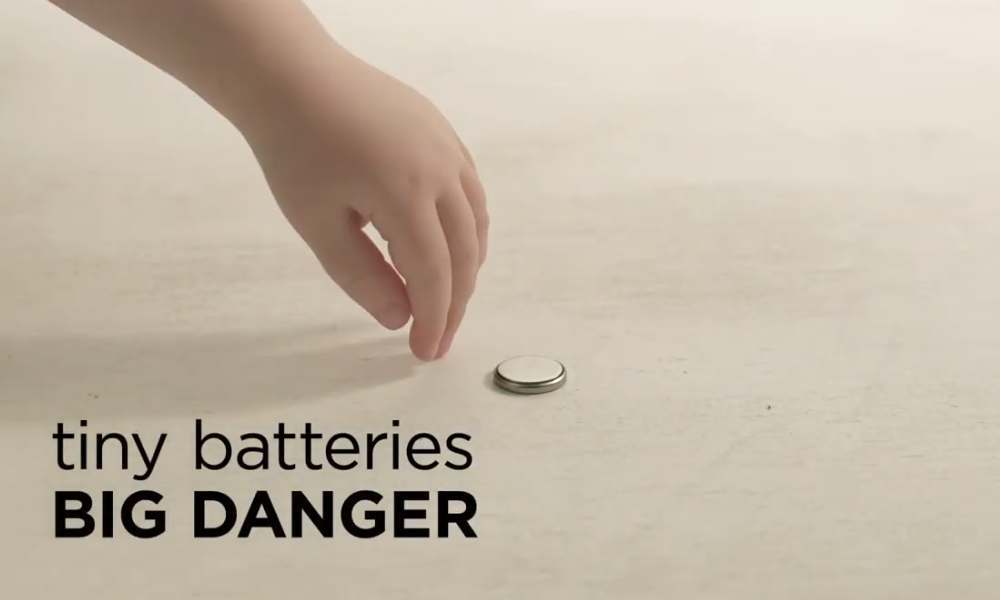Button batteries are lurking everywhere in your home — hearing aids, remote controls, kitchen scales, birthday cards, children’s toys and countless other products.
If swallowed, a button battery can become stuck in a child’s throat and result in catastrophic injuries and even death. Insertion of button batteries into body orifices such as ears and noses can also lead to significant injuries. Knowing the big danger this little battery poses means you can take steps to keep your children safe. There are a number of ways you can protect your family:
- Check before you buy
- Secure button batteries
- Store them out of reach of children
- Safely dispose of them immediately
- Know what to do in an emergency
- Make others aware of the risk
Check before you buy
- Look for products that do not use button batteries at all when buying a toy, household device or novelty item. Other types of batteries are less likely to be swallowed by young children and do not present the same degree of danger if they are. Alternatively, look for products where the battery does not need to be replaced, such as where the product is rechargeable.
- Check for a child-resistant battery compartment, if you do buy button-battery-operated products. This will make it much more difficult for a young child to access the battery.
- Buy new button batteries in child-resistant packaging — that is, the packaging needs to be opened with scissors.
Secure button batteries
- Make sure the compartment that houses the button battery in a product is child-resistant, such as being secured with a screw, so that the product does not release the battery and it is difficult for a young child to access it. A number of products, particularly those purchased from overseas sellers or suppliers, may not be child-resistant, so be sure to check that the product you’re after is as safe and secure as it can be — even if it means spending a few dollars more.
- Even if secure, button battery compartments are not necessarily child-proof. If the product in question is damaged or broken, the button battery inside can come loose. If the product is damaged or the button battery compartment does not close securely, stop using the product and keep it away from children.
Store them out of reach of children
- Keep new and used button batteries out of sight and out of reach of children at all times.
- Keep spare button batteries locked away where it is difficult for children to reach them — lock boxes, secure cupboards or high spaces are perfect for this.
Safely dispose of them immediately
Even when old or spent, button batteries can still pose a threat, so safely dispose of them immediately.
- As soon as you have finished using a button battery, put sticky tape around both sides of the battery. This will make them less attractive to children and avoid the low risk of them catching fire.
- Dispose of them immediately in an outside bin, out of reach of children, or recycle safely.
Know what to do in an emergency
If you suspect your child has swallowed or inserted a button battery, call the Poisons Information Centre immediately on 13 11 26 for 24/7 fast, expert advice. If your child is having any difficulty breathing, contact 000.
Prompt action is critical. Do not wait for symptoms to develop.
Not every health facility can manage injuries due to button batteries. Availability of care depends on where you live. Contacting the Poison Information Centre will help you to be directed to an appropriate medical facility that can manage the injury.
Do not let the child eat or drink, and do not induce vomiting.
Remember, children are often unable to effectively communicate that they have swallowed or inserted a button battery. There may be none of the symptoms below. If you suspect a child has swallowed a button battery, then ask for an X-ray from a hospital emergency department to make sure.
Symptoms to watch out for include:
- gagging or choking
- drooling
- chest pain (this may present as grunting)
- coughing or noisy breathing
- unexplained vomiting or food refusal
- bleeding from the gut — black or red vomit or bowel motions
- nose bleeds — sometimes this can be blood vomited through the nose
- unexplained fever
- abdominal pain
- general discomfort
- spitting blood or blood-stained saliva
- bloody discharge from ear or nose.
Make others aware of the risk
Make sure that grandparents, or anyone else who cares for your child, are aware of the risks of button batteries and know how to keep children safe from them.
https://www.productsafety.gov.au/news/button-batteries-tiny-batteries-big-danger

